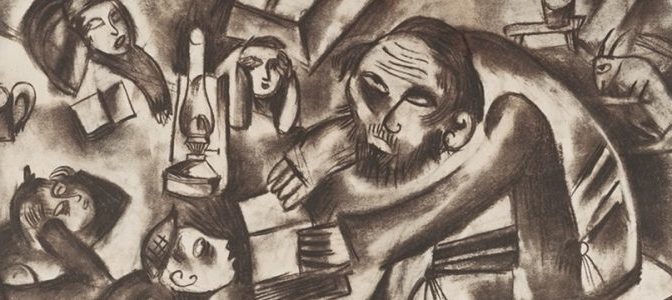
A lecture by Carmen Reichert (Augsburg University) in the frame of the seminar on Modern Jewish History of the Institute of Contemporary History (AV ČR) and CEFRES in partnership with the Masaryk Institute (AV ČR).
Where: CEFRES library, Na Florenci 3, 110 00 Prague 1
When: from 5:30 pm to 7:00 pm
Language: English
Abstract
Narrations on the Choice of Yiddish in Autobiographical Writings after Peretz
It should come as no surprise that literary autobiographies essentially tell us how writers became writers. From Rousseau’s Confessions to Goethe’s Bildungsroman – lire and écrire – an author’s reading lists and their first attempts at writing are crucial topoi to the genre. But the Yiddish writers of the early twentieth century did not grow up with the knowledge that their mother tongue was a literary language. Hebrew and not Yiddish was the language of learning in private schools for Jewish boys. This is why Yiddish writing in the early twentieth-century developed somewhere between the traditional, Hebrew-dominated education system of Cheders and Yeshivas and non-Jewish libraries. According to tradition, written Yiddish texts were primarily intended for women and uneducated men. Therefore, male and female writers developed different writing strategies when writing Yiddish: Whereas women could trace their writings back to early Yiddish autobiographies such as Glikl of Hameln’s “Zikhroynes” (Memories), men preferred to follow Western European traditions. Yiddish autobiographies often link the personal lives of their writers to the history of Yiddish. For example, when Sholem Aleichem compares his life to the market (“yarid”), he simultaneously commits his voice to the “market language” of Yiddish. I. L. Peretz, the “father” of the Yiddish literature, was particularly influential in this context. Not only did he encourage writers to switch to their native language, his autobiography “Mayne zikhroynes” (My Memoirs), which draws inspiration from Romanticism, inspired a great number of autobiographical texts from younger writers.
Carmen Reichert is a postdoctoral researcher at the Augsburg University currently working on a project about literature and language debates in context of the Czernowitz language conference. For more, please see here.

Maria Kokkinou (CEFRES / Charles University) and
Charlotte Grégoreski (IIAC-EHESS / University of Chile)
will be taking part in the seminar called Current Issues. Reflection on Crises organised by CEFRES.
Date: Wednesday, April 28th 2021, 12:30 – 13:50
Where: Online on Zoom.
Organisators: Maria Kokkinou (post-doc at CEFRES / Charles University), Jérôme Heurtaux (CEFRES)
Language: French
Link to join the seminar: https://us02web.zoom.us/j/84097191940
For more information about the programme and the seminar, see the website: http://cefres.cz/fr/seminaires/penser-les-crises.
Credit image: Banksy

Second session of 2018 common epistemological seminar of CEFRES and IMS FSV UK led by
Martin Pjecha (CEFRES – CEU)
Human Agency and Apocalyptic Violence
Where: CEFRES library – Na Florenci 3, 110 00 Prague 1
When: Thursday 08.03.2018 from 3:30 pm to 5 pm
Language: English
Text:
- Matthias Riedl, “Terrorism as ‘Apocalyptic Violence’ On the Meaning, and Validity of a New Analytical Category”, Social Imaginaries 3.2 (2017), pp. 77-107.
Read more about the seminar!

The 8th session of IMS / CEFRES Epistemological seminar will be hosted by:
Zuzana Krulichová (PhD candidate at FSV UK)
Topic: Human Rights
Organisers: Jérôme Heurtaux (CEFRES), Claire Madl (CEFRES), Tomáš Weiss (FSV UK) and Mitchell Young (IMS FSV UK)
Where: on line
To register, please contact: claire(@)cefres.cz
When: Wednesday, May 19th, 4:30 pm- 6:00 pm
Language: English
Reading:
- Amartya Sen : “Human Rights and Capabilities”. Journal of Human Development, Vol. 6, No 2, July 2005.

PhD Students Workshop organized by EHESS and CEFRES will be held on the theme of Humanities and Social Sciences Facing the Unexpected.
Date: April 12, 2021 (9 a.m. – 7 p.m.)
Location: online and at CEFRES (see the link below)
Language: English
Coordination: Falk Bretschneider (EHESS), Jérôme Heurtaux (CEFRES)
Supervisors: Michèle Baussant (CEFRES, CNRS), Falk Bretschneider (EHESS), Emmanuel Désveaux (EHESS), Jérôme Heurtaux (CEFRES), Pavel Himl (FHS UK), Claire Madl (CEFRES), Silvia Sebastiani (EHESS)
The sanitary crisis caused by the Covid-19 pandemic has thrown the whole world into deep uncertainty and radically shaken almost all our habits. This also applies to the research community. Lockdowns, travel restrictions, curfews, closures of libraries or archives and other measures of distance and protection have a direct and sometimes brutal impact on many scientific projects, especially those of many young researchers on fixed-term contracts. This context therefore leads us to question the ways in which humanities and social sciences can deal with uncertainty, the unexpected and the unforeseen, and this in two directions: read more about the workshop here.
Program
9 a.m. Opening by Falk Bretschneider (EHESS) / Jérôme Heurtaux (CEFRES)
9.30 a.m. – 11 a.m.
Introduction: Pavel Himl (FHS UK)
- Arthur Pérodeau (EHESS / UK, associated at CEFRES): Marc Bloch and His Book L’étrange défaite. A Historian Facing the Fall of France
- Tomáš Razím (FHS UK): Oral History in the Time of COVID
11.30 a.m. – 1 p.m.
Introduction: Emmanuel Désveaux (EHESS)
- Miroslav Sedláček (PRF UK): Are Humanities and Social Sciences Strong Enough to Deal with the Unexpected if They Are Overspecialized?
- Zuzana Terry (FHS UK): Facing Unexpected in School Ethnography
Lunch Break
2 p.m. – 3.30 p.m.
Introduction: Silvia Sébastiani (EHESS)
- Maeva Carla Chargros (Palacký University, Olomouc): Rethinking Opportunities & Challenges within an International Context: Networking & Planning
- Elizaveta Getta (FF UK): Challenging Archival Research in Translation Studies
4 p.m. – 5.30 p.m.
Introduction: Michèle Baussant (CNRS, CEFRES)
- Rose Smith (FSV UK / University of Groningen): Wider Acknowledgement of Cyberspace as a Valid Milieu to Do Academic Work in as Well as a Valid Research Context
- Mert Koçak (CEU): Doing “Forced” Digital Ethnography on Forced Displacement: How Does Hyper Visibility/Accessibility of Digital Platforms Affect Ethnography?
6 – 7 p.m. General Discussion
With an intervention of:
- Felipe Kaiser Fernandes (EHESS / CEFRES)
- Tereza Havelková (FF UK)
- Igor Zavorotchenko (FHS UK)
- Ekatarina Zheltova (FSV UK / CEFRES)
To join the meeting: https://us02web.zoom.us/j/83259649736?pwd=RG95RzhyMFlLdjNhUXUzamQzSkhFZz09

Falk Bretschneider, associate Professor at the EHESS
will be taking part in the seminar called Current Issues. Reflection on Crises organised by CEFRES.
Date: Wednesday, April 21th 2021, 12h30 – 13h50
Where: Online on Zoom.
Organisators: Maria Kokkinou (post-doc at CEFRES / Charles University), Jérôme Heurtaux (CEFRES)
Language: French
Link to join the seminar: https://us02web.zoom.us/j/84097191940
For more information about the programme and the seminar, see the website: http://cefres.cz/fr/seminaires/penser-les-crises.






